[Click here for previous segments]
Part III: On the West Bank
I suspect contractors and realtors make a good living in Ramallah. The most striking aspect of downtown Ramallah is the remarkable amount of new housing construction going on, with half-finished apartment complexes sprouting on every other street corner, or so it seems. Ever since the Palestinian Authority (PA) came to town in the early 1990s, Ramallah has been a boom town, and it has a hurried, slapdash, and unattractive boom town feel. I don’t know if they are using sub-prime lending and collateralized debt obligations to finance things, but if I lived in Ramallah, I would keep my portfolio diversified.
I should say that despite the general unfinished feeling of downtown Ramallah, there are a few points of interest for any traveler. There is the Mahmoud Darwish Museum, a very attractive and striking new building whose layers are intended to resemble the region’s red clay layered hillsides, though like many modern museums, the architecture tends to overwhelm the museum’s contents; it is dedicated to Mahmoud Darwish, the preeminent Palestinian poet, who lived in Israel until 1970. I was surprised how many people we spoke to in Israel were unfamiliar with Darwish. A few days after we left Ramallah, we attended a concert by the Israeli-Palestinian singer Mira Awad at Café Bialik in Tel Aviv, who sang a number of her settings of Darwish’s poems, including several dedicated to his one-time Jewish-Israeli girlfriend. Ms. Awad said she liked the idea of bringing Bialik and Darwish together, and I am sure the two poets would have liked it as well.
The other not-to-miss site is the Muqata, the headquarters of the Palestinian Authority, rebuilt from its years under siege by the IDF from 2002 to 2004. The only part of the Muqata that is open to the public is the mausoleum of Yasser Arafat, which is guarded by two PA policemen, stiffly at attention. Although the mausoleum is quite elaborate, the writing on Arafat’s tomb states that this resting place is only temporary, and that when Jerusalem becomes the capital of a Palestinian state, Arafat’s body will be reinterred there—according to the Wikipedia article on the subject, whose accuracy I cannot vouch for— in the Dome of the Rock.
Michael, Kathy, and I traveled to Ramallah to meet two filmmakers. We met in a nice upscale beanery for breakfast, of the sort that proliferate in Tel Aviv, but it felt far from Tel Aviv and somehow quite exotic. Leila is a filmmaker from Gaza who studied in the United States. She had only been in the West Bank and Ramallah for two months. She had to wait two months in Jordan before being allowed into the West Bank, sort of like the way they used to have to stay in Reno for six weeks waiting for a divorce decree. She told us that the only reason that Israel had left Gaza was because it had sucked it dry, and that was the only way Israel would leave the West Bank, leaving nothing behind. She has little confidence in the PA or in their ability to stand up to Israel in any negotiation. She had to leave early because she was expecting her uncle, also a Gazan, to cross into the West Bank from Jordan for a few days around the Christmas holidays. She called later to tell us that her uncle was held up at the border and wasn’t allowed in. “Perhaps,” she said, “later in the week, perhaps not.”
Israeli citizens are not allowed to travel to Ramallah, which is in Area A, the area of the West Bank under Palestinian control, largely consisting of the large West Bank cities. This is supposedly for their own protection, since there is no IDF presence in Area A, but this also greatly inhibits contact between Palestinians on the West Bank and Israelis (especially since most Palestinians on the West Bank cannot enter Israel). Getting into the West Bank from Israel, for either a Jew or a Palestinian, is relatively easy. But the West Bank is like a giant roach motel; the trick is getting out again. On the way back from Ramallah, we passed through the Qalandiya checkpoint. Michael, an American-Israeli who travels to Israel on an Israeli passport, was admonished by a soldier for traveling into Area A. Michael, who can be something of a wisenheimer, started bantering with the soldier:
Soldier: Did you know you are forbidden to enter the territories?Michael: Many Israeli settlers live in the territories and enter all the time.Soldier: The general in charge of the territories has decreed that it is dangerous for Israelis to enter Palestinian-controlled areas.Michael: I disagree, and anyway, I am a civilian. I don’t really care what the general thinks.Soldier: The law says you cannot enter Area A. There are big red signs warning you at every entrance to Area A. We have made a record of this incident. If you ever enter Area A again, you will be prosecuted.
The soldier was holding both our passports, and since I have a general rule about not picking fights with armed military personnel in possession of my passport, I was a little perturbed by this turn of events. But Michael got off with a warning, and we were reunited with our documents. When we discussed this later, he said that if he had been a Palestinian and spoken in that way to a soldier, he would have been detained, but as an American, Israeli and Jewish, he would get off with an inconsequential admonishment. In talking back to the soldier, he was just exercising what he called his “white privilege.” Michael was right. There were no untoward consequences from the incident. But I had a first-hand lesson on the checkpoint hell that is the daily lot of Palestinians on the West Bank. About 24 hours later, Michael, Kathy and I were back in Area A.
Christmas Eve in Bethlehem: We were told that the crowds were a little bigger than the year before, but for the most Christmas-y place on the planet, the crowds were underwhelming. And unfortunately for hoteliers, there were plenty of rooms in the inns. We three were almost the only guests of Issa and Dalia, Palestinian Christians who run a hostel one block from Manger Square. Issa is also a Protestant minister, and their establishment includes, on one floor, a small church where, he says, about 30 or 40 people attend services on Sunday.
Issa is an interesting guy. In the United States he would definitely be considered a right-wing evangelical conservative. He is strongly opposed to same-sex marriage and abortion. His favorite candidate in the 2016 election is Mike Huckabee, and he asked us several times about his prospects. (We were not terribly encouraging.) He strongly opposes radical Islam, and condemned President Obama’s decision not to militarily intervene against Assad and against ISIS.American evangelicals who stay at his hostel have filled his mind with a garden of misinformation about Obama. “Isn’t it true,” Issa asked, “that Obama plans in the near future to abolish Congress and thereafter rule by decree as a dictator?” No, we responded. “Isn’t it true that Obama took his oath of office on Jefferson’s Bible, a version of the New Testament that excluded all mention of the divinity of Christ?” Not so. Indeed, we said (after checking on the Internet) Obama was sworn in on Lincoln’s and Martin Luther King, Jr.’s Bibles, both of which include John 3:16 and other evangelical highlights.
But Issa is also a Palestinian, and one wonders what he thinks when his right-wing American guests go off on their Christian-Zionist jags. He told us some stories of the Intifada. “A soldier knocked on my door and asked if we had any weapons. I said my only weapons are Jesus Christ and the Holy Spirit, and these are the only weapon anyone needs. Another soldier (and a rather stupid one at that) came into my house, looked around and saw a picture of Jesus on the wall, and asked if it was picture of a Fatah revolutionary. No I said, this is Jesus Christ, the savior of the world, and right now he is praying for your soul. Another time, a religious soldier, with something on his head, came to my door. I asked him, don’t you believe that the Prophets demanded righteousness and justice of Israel, and that Israel unredeemed would be sorely punished for its sins? The soldier told me to shut up.”
As you might expect, it was difficult to get Issa to answer straightforward political questions without him citing chapter and verse, but his main views are clear. He would like to see a Palestinian state and be free of Israeli intrusion on his life and in Bethlehem. But he wants a Palestinian state with “honor” and “dignity,” with Palestinians treated as equal partners with Israel. And he doesn’t think the current PA is capable of doing this. If Issa, representing moderate, anti-Hamas, Palestinian opinion, has lost faith in the two-state solution, it’s hard not to conclude that this option is moribund.
Issa has a number of siblings, each of whom, it seems, belongs to a different Christian denomination. We visited another brother’s family, who lives in an adjacent building. We met with about ten people, relatives and friends, in their twenties, most of whom spoke fluent, unaccented American English. (They had all studied at Christian colleges in the states.) The conversation turned to a familiar topic, the hardships of Israel’s system of checkpoints. They have to leave and enter the West Bank through the Allenby crossing, and complained that the trip from Amman to Bethlehem, a distance of only about 45 miles, usually takes about eight hours, due to a series of checkpoints at the border. Most do not have the right to travel regularly into Jerusalem but these restrictions are temporarily lifted around Christmas.
Marcelle works as a teacher in a girl’s school in East Jerusalem, so she has a pass to travel daily into Jerusalem, but she never knows how long to add to her commute for the checkpoint—usually about an hour, just to be safe. One day, she said, she was stuck in a crowd in a holding bay in a checkpoint for half an hour and no one was passing through, when they realized the soldier who was in charge had fallen asleep. So they started screaming at him and he woke up. Sometimes Palestinian workers crossing into Israel chivalrously let her go to the front of the queue, even when they have been waiting for up to two hours to get permission to cross. “They treat me as they would their daughters.”The most annoying thing, she said, about the checkpoint system is its utter capriciousness and uncertainty; you don’t know how to prepare or what to expect. One day, she said, she got so annoyed that she told the soldier in her perfect American English, that she was a “citizen of the world” fumbled in her bag for her ID, saying she couldn’t find it, flashed her eyes flirtatiously, and the soldier let her through. It was a small victory.
Kathy and I went with Marcelle and her brother and father to midnight Christmas mass, though held at the reasonable time of 8 PM. By this time Manger Square was jumping, with a huge lit Christmas tree, the usual stars and strings of lights, and on stage a choir was singing—what else?— “Adeste Fideles.” Images of Santa Claus abounded, a nicely secular Christmas image for a crowd that, to judge by the number of head scarves, was at least a quarter to a third Muslim. (We ran into several instances on our trip of Muslim children badgering their parents to take them to Manger Square for Christmas Eve. The “December dilemma,” I was interested to learn, is not limited to American Jews.) Christmas Eve has become a major holiday for the Palestinian Authority, and all sorts of Palestinian dignitaries were bustling about. Along with the tree, manger square was dominated by a huge sign proclaiming “All I Want for Christmas is Justice.”
We went to a Melkite Catholic church just off Manger Square. It was a beautiful service, in Arabic, in an ancient Byzantine rite. The priest and his son, both wrapped in splendid vestments, had wonderful singing voices, and the entire congregation, about 200 in all, sang the soaring melodies and melismas of the ancient hymns as if they were a trained choir. Kathy felt transported back to the roots of Christianity, and the Melkite Church and rite, tracing its roots back to Antioch in the first and second century CE, is perhaps as close to the early Church as you can get in the 21st century. It was a special, memorably spiritual evening. Afterwards, we went for refreshments in the church’s social hall, adorned with a large photograph of Yasser Arafat.
Furedis, Israel: A few days we found ourselves in Furedis, near Haifa, one of the few Arab towns on the Mediterranean to survive 1948 with its population intact. Musa, an old Tel Aviv University college chum of Michael’s had invited us for dinner. Musa has done well for himself and his family. His house could only be described as a mansion, high on a hill, with a glorious view of the sea. The house, built in an updated 18th century Syrian style, with its multiple interior balconies and levels, and exquisite Koranic quotations on the walls, was by far the most impressive private dwelling we saw in Israel, as we reclined on our divans. Musa and his children are integrationists, determined to be both Israeli and Palestinian, a brood of successful entrepreneurs, accountants, and lawyers. A daughter is a successful prosecutor in the white collar crimes division of Israel’s Ministry of Justice.
One of the first topics that came up was Hanin Zoabi, the gadfly Palestinian Member of Knesset who often finds herself in hot water because of controversial statements (and is currently serving a six-month suspension). One of Musa’s sons said, to general agreement by the family, that she is a loudmouth provocateur who is hurting the Palestinian cause, and he just wished that she would shut up. Michael disagreed, arguing that sometimes you have to be a little outrageous to attract attention in a country that systematically ignores and discounts Israeli Palestinian opinion, and that, in any event, right-wing, anti-Arab rants by MKs are rarely if ever censured, which surely is the case. The political discussion, like so many we had in Israel during our time there, revolved around the choice of voting for either Labor-Livni or Meretz. Most were going to back Labor, over Michael’s objections. There was agreement by Musa’a family that this is no time to throw away your vote on an Arab list that has no power.
One of Musa’s businesses is running an advertising agency, directed at Israeli Arabs, and he told that he recently acquired the El Al account, along the thankless task of coming up with an advertising campaign to get more Israeli Arabs choose the airline—“ “Fly El Al, the airline that will treat you like you’re home.” Musa recently had an op-ed in Yediot Ahronot, the major Israeli newspaper, written in his excellent Hebrew, complaining that a new Arab town in the Galilee, the first new non-Bedouin Arab town in Israel be constructed since 1948 (and what a shameful statistic that is) was being planned as an entirely Arab settlement. “Isn’t it time that Israel build towns for both Jews and Arabs?” We mentioned our visit to Neve Shalom, one of the few intentional, mixed Jewish-Palestinian communities in Israel, but it’s tiny, no more than 90 or so families, and asked Musa about his objections to the new Arab town:
—I understand your objections, but in the end isn’t it a positive development, that after destroying some 400 Arab communities in 1948, and waiting some 65 years, Israel is finally getting around to making an entry on the other side of the ledger?—No doubt, but it would be an even more positive development if the Israeli government would recognize the radical principle that Jews and Arabs actually could be neighbors. Jews and Palestinians will never be equal citizens of Israel as long as they live in separate communities and go to separate schools.
Even though I knew about it, I was still shocked by the hyper-segregated nature of Israeli society within the Green Line, with almost every town entirely Jewish or entirely Arab, with the twain meeting very rarely. (The large cities are mixed only to the extent that they contain segregated Jewish and Arab neighborhoods. And of course segregation is absolute on the West Bank.) And this segregation is exacerbated by separate school systems for Jews and Arabs. An Israeli equivalent of Brown v. Board of Education doesn’t seem very likely any time soon.
Musa and his family are proud to be Israeli and proud to be Palestinian, and this “double consciousness,” to use W. E. B. Du Bois’s famous phrase, doesn’t seem to have caused them much angst, though our conversations on the point were not that probing. One of his sons told us of the utility of having Israeli and Palestinian identities, each to be employed when useful. They certainly are proud Palestinians. His son told us of recent trips to Ramallah to develop some business there. Musa had just returned from the Hajj, and he had a wonderful time, reveling in the ethnic and racial diversity of the Muslim world. He did complain though that that good Mecca hotels quintuple their prices for the duration. (Just like the American Hajj, the Super Bowl, I thought.) An admirable man and an admirable family. But it’s hard not to think that Musa, like most integrationists, has spent his life joining a club that still isn’t sure it wants him as a member.


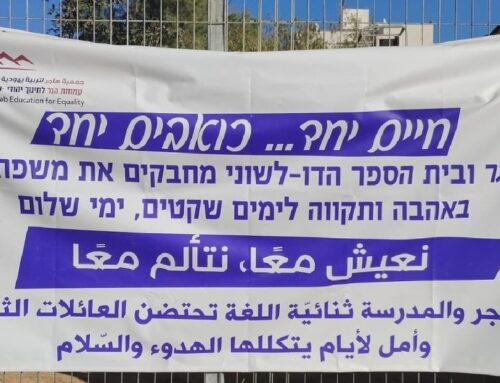
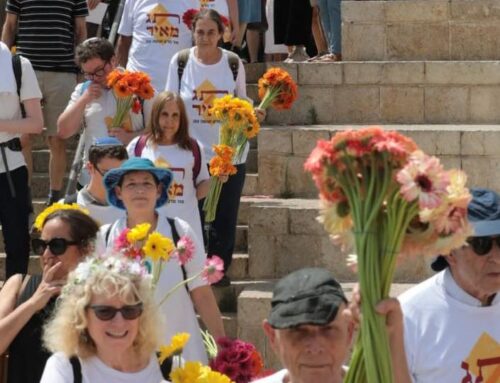
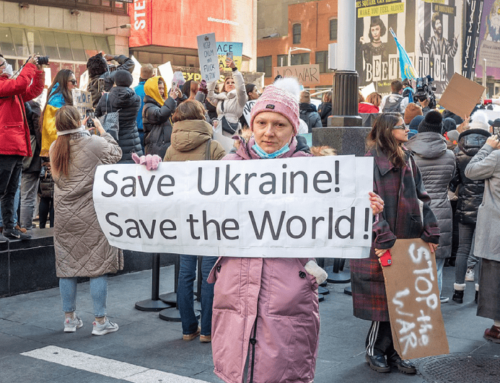
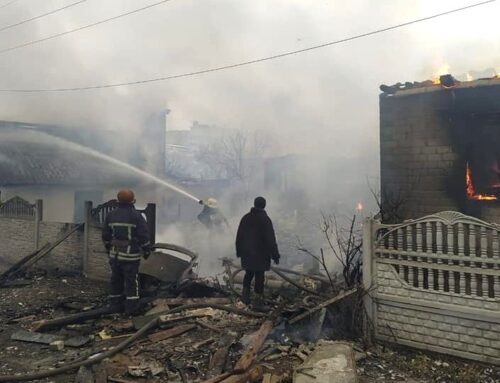
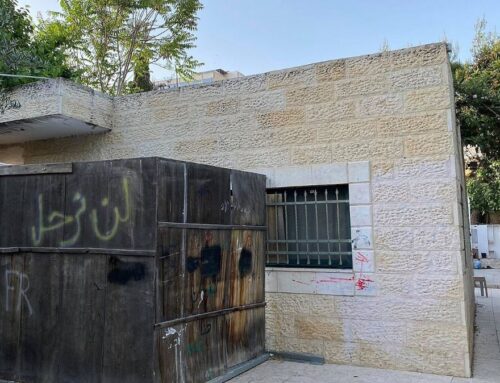
Leave A Comment